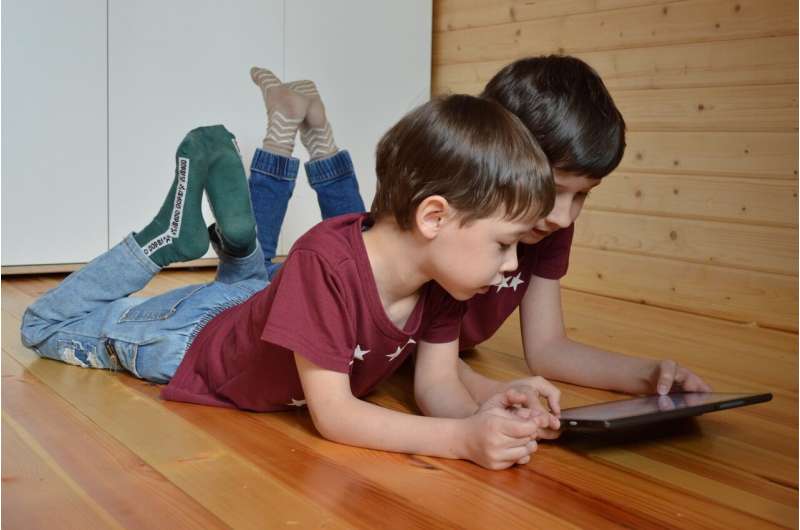This article has been reviewed according to Science X's editorial process and policies. Editors have highlighted the following attributes while ensuring the content's credibility:
fact-checked
peer-reviewed publication
trusted source
proofread
Getting kids outdoors can reduce the negative effects of screen time

If you have young children, you're likely worried about how much time they spend staring at a screen, be it a tablet, phone, computer, or television. You probably also want to know how screen time affects your child's development and wonder whether there's anything you can do to balance out any negative effects. New research from Japan indicates that more screen time at age 2 is associated with poorer communication and daily living skills at age 4—but when kids also play outdoors, some of the negative effects of screen time are reduced.
In the study, which will be published in March in JAMA Pediatrics, the researchers followed 885 children from 18 months to 4 years of age. They looked at the relationship between three key features: average amount of screen time per day at age 2, amount of outdoor play at age 2 years 8 months, and neurodevelopmental outcomes—specifically, communication, daily living skills, and socialization scores according to a standardized assessment tool called Vineland Adaptive Behavior Scale-II—at age 4.
"Although both communication and daily living skills were worse in 4-year-old children who had had more screen time at aged 2, outdoor play time had very different effects on these two neurodevelopmental outcomes," explains Kenji J. Tsuchiya, Professor at Osaka University and lead author of the study. "We were surprised to find that outdoor play didn't really alter the negative effects of screen time on communication—but it did have an effect on daily living skills."
Specifically, almost one-fifth of the effects of screen time on daily living skills were mediated by outdoor play, meaning that increasing outdoor play time could reduce the negative effects of screen time on daily living skills by almost 20%. The researchers also found that, although it was not linked to screen time, socialization was better in 4-year-olds who had spent more time playing outside at 2 years 8 months of age.
"Taken together, our findings indicate that optimizing screen time in young children is really important for appropriate neurodevelopment," says Tomoko Nishimura, senior author of the study. "We also found that screen time is not related to social outcomes, and that even if screen time is relatively high, encouraging more outdoor play time might help to keep kids healthy and developing appropriately."
These results are particularly important given the recent COVID-19-related lockdowns around the world, which have generally led to more screen time and less outdoor time for children. Because the use of digital devices is difficult to avoid even in very young children, further research looking at how to balance the risks and benefits of screen time in young children is eagerly awaited.
The article, "Outdoor play as a mitigating factor in the association between screen time for young children and neurodevelopmental outcomes," was published in JAMA Pediatrics.
More information: Kenji J. Tsuchiya et al, Outdoor play as a mitigating factor in the association between screen time for young children and neurodevelopmental outcomes, JAMA Pediatrics (2023). DOI: 10.1001/jamapediatrics.2022.5356





















